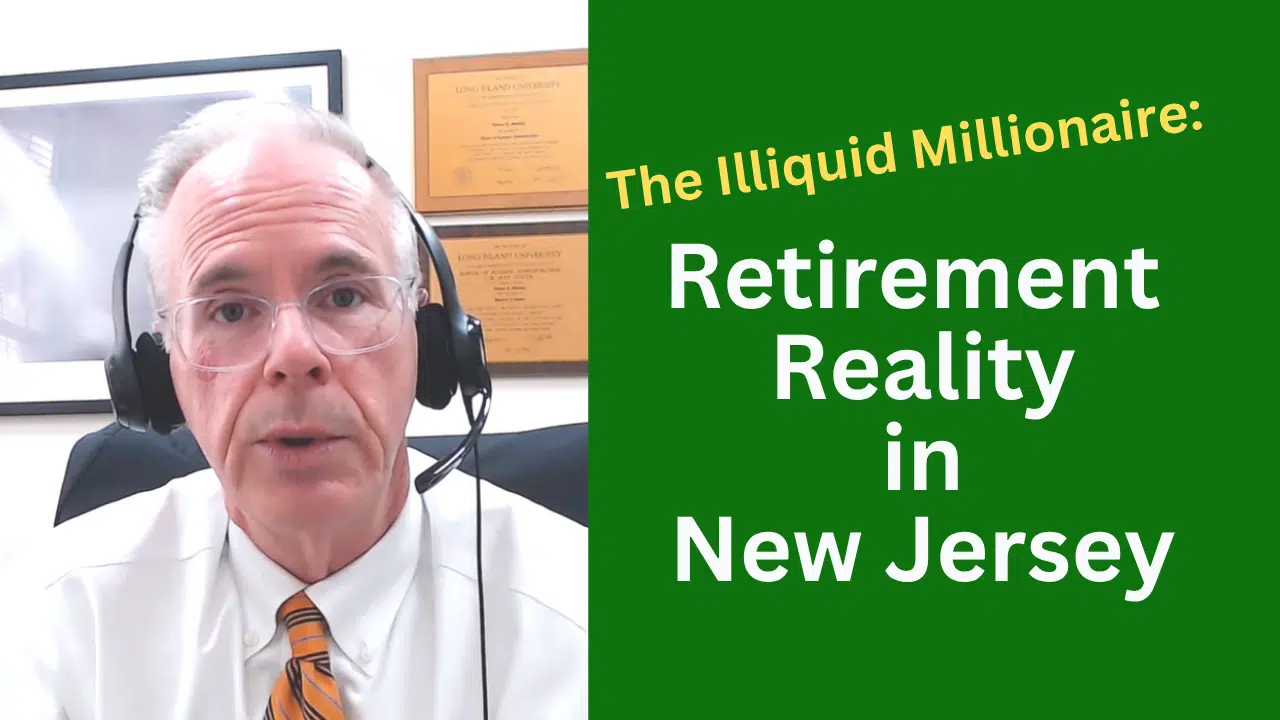The Illiquid Millionaire: Retirement Reality in New Jersey
How Can You Be Rich – But Still Broke In 2025?
Takeaways:
1. Significant appreciation in New Jersey property values has created the illiquid millionaire. It’s not very easy to turn into cash.
2. Likewise, 401k accounts have helped create the feeling of an illiquid millionaire. Hard to access money without tax implications.
3. Distributions from 401(k) and IRA accounts are fully taxable as ordinary income.
4. Required minimum distributions (RMDs) may elevate retirees into higher tax brackets.
5. A coordinated financial strategy may help improve liquidity and tax efficiency in retirement.
The Illiquid Millionaire: Retirement Reality in New Jersey – Links
Catch all our Mullooly Asset videos here
Subscribe to the Mullooly Asset YouTube Channel
Watch this episode (“The Illiquid Millionaire”) on our YouTube Channel
Link to Bloomberg article (paywall): The Era of the Illiquid Millionaire
The Illiquid Millionaire: Retirement Reality in New Jersey – Transcript
The Illiquid Millionaire
There was a recent opinion piece in Bloomberg, on October 17th, 2025.
The title was, the “Era of The Illiquid Millionaire is Here,” and I want to, after reading it, I want to expound on it. And so I figured I’d flip on the camera and talk to you about it.
Early in my career, in the mid 1980s, we had folks that would sell their homes in Bergen County, or someplace in northern New Jersey. And they would buy a two bedroom house in a retirement community in Toms River or somewhere in Ocean County.
And they would do a couple of things:
They would go out and buy a Cadillac.
They would buy a baseball hat, and across the top it would say “retired.”
And they would go on a cruise.
And along the way, they would drop $500,000 into CDs at the bank.
And do you know what?
That worked out really well.
Now we’re in a situation where you may be sitting in Monmouth County, in a home that’s now worth a million dollars.
Maybe you paid $200,000 for it, 30 years ago.
You decide, “hey, we want to sell the house because it’s worth way more than we’ll ever see again.”
After selling the house, and paying the taxes…
You will have some capital gains on that. And, paying the broker, paying the fees to sell the house.
You may find out that you’ll be “downsizing” to a smaller home – or something in a retirement community; say in Farmingdale where two bedroom houses selling for $825,000.
You may actually have to bring money to the closing.
So the era of the illiquid millionaire… this really resonates with us.
Because we’re seeing folks that have homes that are now worth over a million dollars, but they can’t turn that into cash.
Likewise, with a 401k account.
When you put money in – you probably got a tax deduction, when you put the money into it. That’s because it came out on a pre-tax basis as you were making contributions.
But that money wasn’t growing tax free.
It’s been growing tax deferred.
At some point, the taxes WILL have to be paid on this money.
Now, I can’t think of a situation where someone with a million dollars in a 401k, or an IRA, would NEED to take all of that money out. All at once.
Heaven forbid a situation like that comes up in your life.
But that would certainly put you into the top federal tax bracket AND the top state bracket, uh, tax bracket here in New Jersey, which, by the way, is 10.75%.
It’s almost 11% – on top of the federal taxes.
So this can really be very costly.
But even if you were to take money from your retirement account out… it is always coming out as ordinary income.
Even if you were to take it out, if you had a million dollars, say $50,000 a year, over 20 years.
It’s still income. It’s still income that you’re going to have to report and pay taxes on.
And this is something that a lot of folks who are now approaching their required minimum distributions, their RMD’s, are now facing as well. Like, “Hey, I’ve worked really hard. I’ve saved a lot of money. I now have a million dollars in a retirement account. Now I have to take out money every year as part of my required minimum distribution. This is pushing me into another tax bracket.”
Yeah.
This is a a problem. And this is why you should be working with your planner, to see what options you have.
Can you avoid the taxes? Probably not.
But you may be able to do some other things, that may help improve the situation.
We’re seeing a lot more people who have that “wealth effect.”
They FEEL wealthy – because their home is suddenly worth way more than they anticipated, and they have a lot more money in their retirement account than they ever dreamed of having.
But it’s not liquid.
It’s not something that you can turn into cash tomorrow.
Important lesson as you’re looking at your balance sheet and looking at your cash flow statement.
That is something that we do with our clients all the time.






